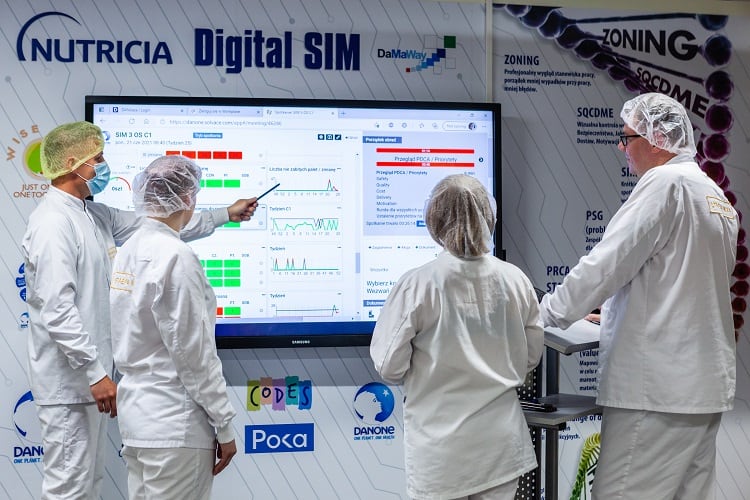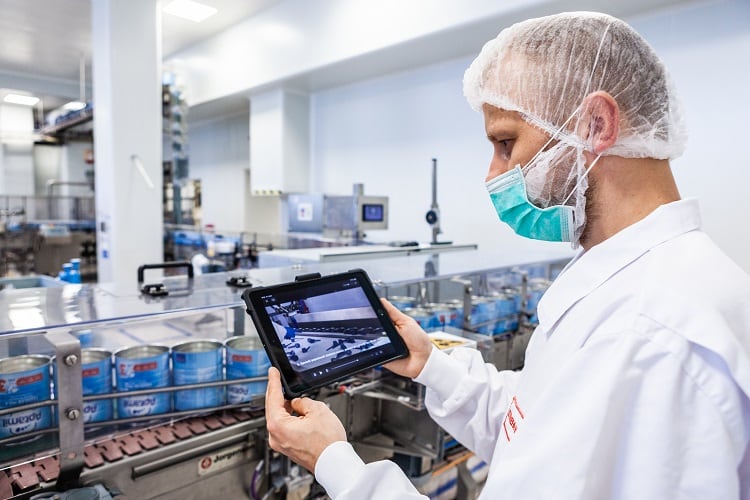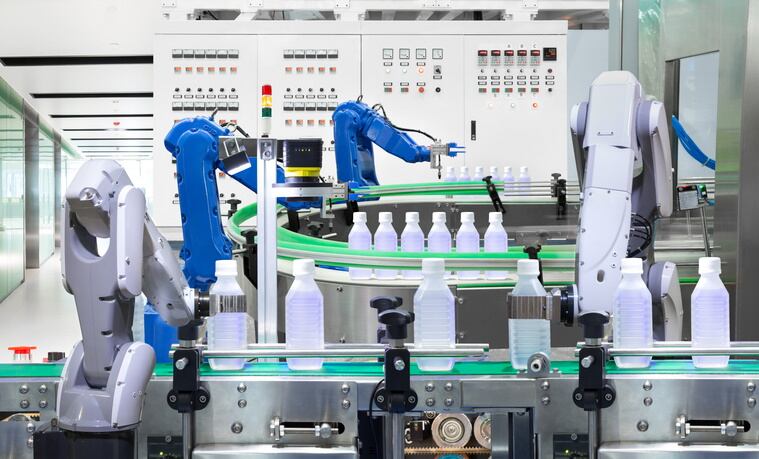The global manufacturing community is ‘lagging behind’ in its adoption of Fourth Industrial Revolution technologies, according to the World Economic Forum (WEF). With more than 70% of companies ‘stuck in pilot purgatory’, only a ‘select few’ are deploying advanced manufacturing at scale.
WEF awards those leveraging Fourth Industrial Revolution technologies to ‘transform’ manufacturing with entry into its Global Lighthouse Network.
Up until now, 103 manufacturing Lighthouses had been selected by WEF. But today (11 October), 11 more were added – including Danone’s baby food and infant formula factory in Opole, Poland.
According to Danone, the site in southern Poland has been central to its Digital Manufacturing Acceleration Program, headed up by global digital operations transformation director Giovanni Pacini.
FoodNavigator caught up with Pacini to find out how new technologies are digitally transforming the facility to improve manufacturing efficiencies, all the while reducing its environmental impact.
The ‘connected’ worker
Digital transformation at Danone’s Opole factory was already underway before the Digital Manufacturing Acceleration Program launched in early 2021.
Over the last 18 months, the programme has worked to ‘boost’ the impact of digital initiatives, enabling ‘overall better use of technology’ and a ‘better way of working’, explained Pacini.
The result is an ‘incredibly high’ level of adoption of digital tools at Opole. And everyone is embracing it: “Whether you’re talking to the line operators or to the director, digital is absolutely part of the DNA.”

So what kinds of ‘digital transformations’ has Danone implemented at the site?
An important tool, according to Pacini, is the digital ‘connection’ of workers. By connecting operators’ applications, information on the efficiency of production lines is received in real time.
“No matter a worker’s role, they are interacting with each other. Our applications are building a community of users, and they’re using this application to scan their work code, tag different posts, and [note potential] improvement opportunities related to different pieces of equipment.”
In practice, this means that workers scan QR codes attached to production lines with their tablets, and can download work instructions, or suggest improvement ideas – which Pacini explained are ‘quickly escalated’ to the shift leader and further up the chain of command.
“From production to quality to maintenance, this flow of information is completely inside these digital tools. This becomes a very powerful [tool] to improve our performance routine, while empowering workers to feel accountable and committed to the overall performance and improvement of the factory.”
Instantaneous troubleshooting for manufacturing efficiencies
By collecting data on production lines in real-time, any issues that require attention can be acted on immediately. This leads to manufacturing efficiencies.
“The digital tool, which is connected to every equipment in the line to record its status, is able to capture every micro stoppage,” explained Pacini. Prior to installing this tool, Danone was not recording any stoppage lasting less than one-minute in duration. “Now, we track every single hiccup in the line, even one that lasts just a few seconds.
“On top of that, we have mounted a speed camera solution that records what is happening [in the line] at the moment of the breakdown.”
This helps the factory team to troubleshoot in a faster and more precise manner, looking to the root cause of the problem impacting the line’s performance, we were told.
Between 2019 and 2021, Opole has achieved a 19% reduction in manufacturing costs, and efficiency gains of 12%.
Digital tools for environmental sustainability
Improving manufacturing efficiencies also helps reduce the environmental footprint of the facility.
“The higher the efficiency of equipment, the more you are reducing energy consumption per unit [of product] produced because the line is simply producing more in the same timeframe,” explained Pacini.
Danone has also achieved significant energy reductions by introducing artificial intelligence in the factory’s drum dryer, which it uses to prepare the raw materials for infant formula. Using machine learning, the equipment can optimise the settings based on real-time data.
Dryers use ‘a lot’ of energy, we were told. By leveraging an AI algorithm, the dryer is ‘continuously analysed’ to ensure moisture levels are controlled in a ‘much more precise way’ – which also leads to energy savings.
Overall, this initiative has helped ensure process stability, reduce wastage, and cut energy consumption by 40%.

Danone has also digitised the air conditioning and ventilation systems in its production areas. Since different spaces have different requirements in terms of temperature and humidity, when a particular area is not being used for production, the company can now adapt its systems in those spaces to reduce energy consumption.
Overall, the factory has reduced its greenhouse gas emissions by 50% and cut its energy consumption by 23%. Other sustainability initiatives include reducing water usage by 25%.
Digital expansion across Europe, US, and beyond
To implement the transformation at Opole, a ‘comprehensive’ digital training programme has seen all the factory’s workforce upskilled in new processes and ways of working, including 20 employees who can now code their own Robotic Process Automation robots.
According to Danone, the programme has helped create more skilled jobs for the local community, with the introduction of a dedicated digital team.
But the digital transformation undergone at Opole is just one element of Danone’s Digital Manufacturing Acceleration Program.
So far, the programme has introduced more than 20 digital solutions to 39 Danone factories across Europe to increase productivity and efficiency across all food and beverage categories.
“The Digital Manufacturing Acceleration programme is intended to drive, at-scale, digital transformation across a network of factories – not just one,” said Pacini.
Indeed, some of the new digital tools implemented at the Opole site had previously been implemented in other Danone factories. The programme is focused on the ‘networking’ and the ‘sharing’ of learning across different sites, the programme lead continued.
“This is not just about technology, but about how to use it, which is a difficult part in our journey. At the moment, we have 35 factories in our programme across Europe in North America.
“We are already planning expansion into other geographies, such as Latin America and Asia.”




